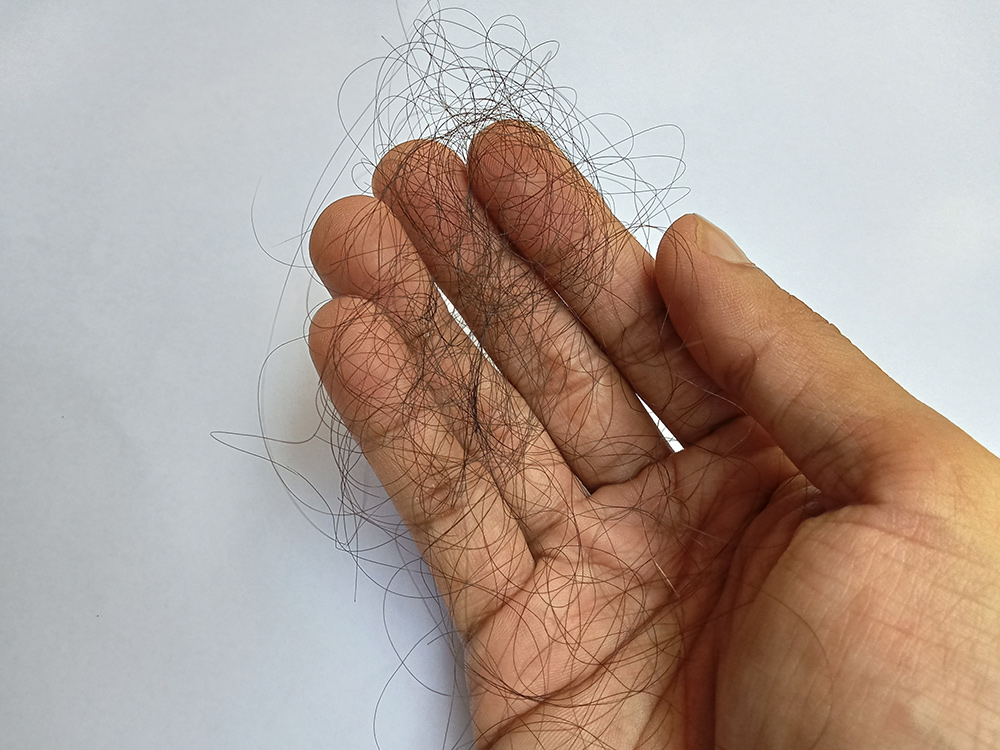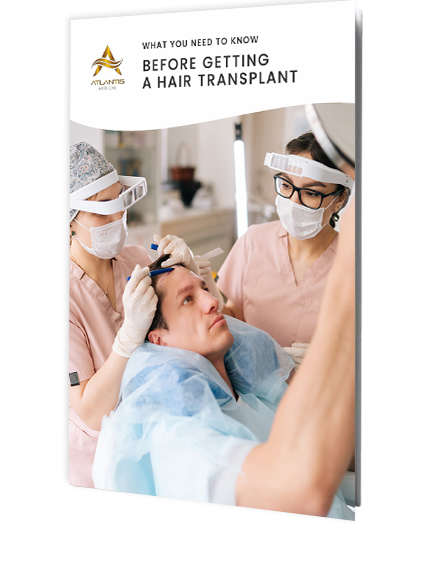Stress-Induced Hair Loss How to Manage and Prevent It
- September 2, 2025
- Dr. Vikram Jayaprakash
Last updated on September 9, 2025
Table of Contents
ToggleUnderstanding the Link Between Stress and Hair Health
Stress can affect the body in ways we often don’t expect, and hair health is no exception. During or after challenging periods, some people notice more shedding, slower regrowth, or changes in hair texture. This leads to the common question: Does stress cause hair loss?
The short answer is that yes, stress can play a role, but it’s usually part of a larger set of contributing factors. By understanding the different ways stress can influence the hair growth cycle (and what you can do to manage it), you can take steps to protect your scalp and maintain healthy growth moving forward.
Understanding Stress-Induced Hair Loss
Stress-related hair loss refers to different patterns of thinning or shedding linked to high stress levels. The most common include:
- Telogen effluvium – More hairs than usual shift into the resting phase, leading to shedding a few weeks or months later.
- Alopecia areata – Stress may trigger an immune response that causes patchy hair loss.
- Trichotillomania – A compulsion to pull or twist hair, often linked to emotional strain.
While stress can trigger these changes, other factors such as genetics, hormonal shifts, poor diet, or illness often play a role too.

How Stress Affects the Hair Growth Cycle
Hair grows in three main phases. The anagen phase is the long growth stage that can last years, followed by the short catagen transition and then the telogen resting and shedding phase. Under normal circumstances, most hairs are in anagen.
When the body is under significant stress, hormonal and chemical changes can push more follicles into telogen early. As shedding occurs at the end of the cycle, hair loss often appears weeks or months after the stressful event.
Common Triggers of Stress-Related Hair Loss
Stress that affects hair growth can come from many different situations, and it’s common for more than one to be involved at the same time. Some of the most frequent triggers include:
- Physical stress – Illness, high fever, surgery, or childbirth
- Emotional stress – Bereavement, relationship breakdown, or ongoing workplace pressure
- Lifestyle strain – Poor sleep, unbalanced diet, or overtraining without enough recovery time
Signs You Might Have Stress-Induced Hair Loss
Stress-related hair loss can appear in different ways and the signs aren’t always obvious at first. Paying attention to changes in how your hair looks, feels, or behaves can help you spot potential problems early. Common indicators include:
- Thinning across the scalp rather than in one specific area
- More hair on your pillow, in the shower, or in your hairbrush
- Slower regrowth where shedding has occurred
- Small round patches (in alopecia areata)
As these signs can overlap with other hair loss conditions, a professional assessment is important to confirm the cause and guide the right approach.

How to Manage Stress-Related Hair Loss
Addressing stress-induced shedding works best when you support both your overall wellbeing and your hair’s natural cycle. Finding ways to reduce stress (whether that’s regular gentle exercise, relaxation techniques, or time spent on enjoyable activities) helps the body return to balance.
A varied, nutrient-rich diet supports healthy follicle activity, as does consistent, good-quality sleep. Caring for your hair gently, avoiding harsh chemical treatments and frequent heat styling, reduces extra damage. If shedding is sudden or ongoing, a hair loss professional can confirm the cause and suggest the most suitable options.
How to Manage Stress-Related Hair Loss
Managing stress-related hair loss works best when you focus on both your overall wellbeing and the health of your hair. Simple, consistent changes can help restore balance and support the growth cycle.
- Reduce stress – Gentle exercise, relaxation techniques, or hobbies you enjoy can help regulate your stress response.
- Eat well – Include protein, iron, zinc and vitamins in your diet to nourish hair follicles.
- Sleep consistently – Good-quality rest allows the body to repair and recover.
- Be gentle with hair – Avoid harsh chemical treatments, high heat styling and tight hairstyles.
- Seek professional advice – A hair loss specialist can confirm the cause and recommend suitable options.
Treatment Options for Stress-Induced Hair Loss
While stress-related hair loss often improves once the source of stress is addressed, some people benefit from professional treatments to support regrowth and maintain scalp health. At Atlantis Medical, we offer a range of non-surgical hair loss solutions designed for both men and women, including medical therapies and in-clinic treatments that can be tailored to individual needs.
Our approach focuses on promoting healthy hair growth, optimising scalp condition and providing personalised care that works alongside lifestyle and stress management strategies.
Final Thoughts
So, does stress cause hair loss? Yes, it can — but in many cases, the effects are short-lived and improve once the underlying cause is resolved. The key is to notice the signs early, take practical steps to reduce stress and maintain healthy daily habits that support both your scalp and hair growth.
If changes in your hair are causing concern, a professional assessment can help identify whether stress is the main factor or if something else is contributing. With the right combination of lifestyle adjustments and targeted care, it’s possible to restore balance to the hair growth cycle and protect your scalp health for the future.
How to Book a Consultation
Booking your consultation is simple.
- Call us on (03) 9070 5234
- Contact us via our website
- Email us at enquiries@atlantismedical.com.au
- Or visit us at Level 2, 148 Glenferrie Road, Malvern, Vic 3144
Opening Hours
Mon – Fri: 8:30am – 5:00pm
Sat – Sun: Closed
Frequently Asked Questions
How can I stop hair loss due to stress?
Reducing stress is the first step, through activities such as exercise, mindfulness, or relaxation techniques. Pairing this with balanced nutrition, quality sleep and gentle hair care can help the hair growth cycle recover.
How long does stress-induced hair loss last?
For most people, shedding caused by stress lasts a few months before regrowth begins. The exact timeframe varies depending on overall health, stress levels and whether other factors are contributing.
Can stress cause permanent hair loss?
Stress-related hair loss is usually temporary. However, if other conditions such as genetic hair loss or illness are involved, the impact may be longer-lasting and require targeted treatment.
How can I regrow hair lost due to stress?
Once the source of stress is managed, hair often regrows naturally. Supporting the process with a nutrient-rich diet, regular rest and, if needed, professional treatments can help optimise results.
What is the best treatment for hair loss caused by stress?
The most effective approach combines stress management with tailored hair and scalp care. In some cases, professional options such as medical therapies or in-clinic treatments may be recommended to encourage regrowth.
Any surgical or invasive procedure carries risks. Before proceeding, you should seek a second opinion from an appropriately qualified health practitioner.

About the Author
Dr. Vikram Jayaprakash
Dr. Vikram Jayaprakash is the Clinical Director of Atlantis Medical, one of Melbourne’s premier hair restoration clinics. Trained at the University of Southampton Medical School, he spent over a decade working alongside Dr. Russell Knudsen at the renowned Knudsen Clinic before establishing his own practice. As one of only three doctors in Australia to hold Board Certification from The American Board of Hair Restoration Surgery and one of two to attain Fellowship status with the International Society of Hair Restoration Surgery, Dr. Jayaprakash brings unparalleled expertise to every procedure.
Categories
Categories
- Female Hair Loss (7)
- General (3)
- Hair Health (11)
- Hair Loss (16)
- Hair Loss Treatment (10)
- Hair Transplant (20)
- Male Hair Loss (9)
- Non Surgical Treatments (1)
- Scalp Health (6)






